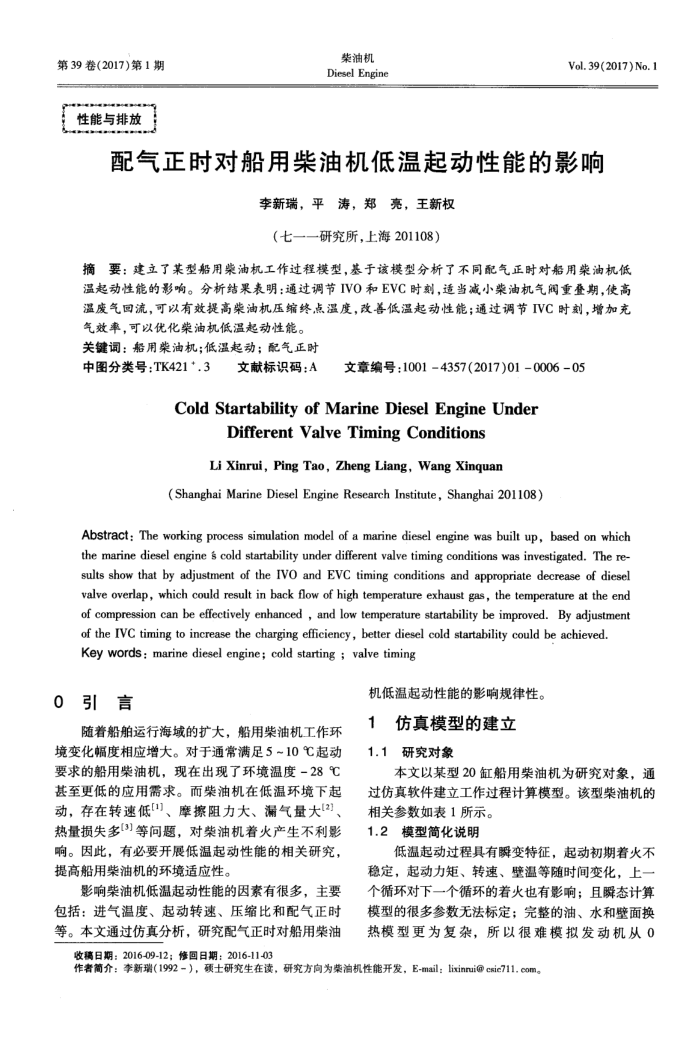您当前的位置:首页>论文资料>配气正时对船用柴油机低温起动性能的影响
内容简介
 第39卷(2017)第1期性能与排放
第39卷(2017)第1期性能与排放柴油机 Diesel Engine
Vol. 39(2017) No. 1
配气正时对船用柴油机低温起动性能的影响
李新瑞,平涛,郑亮,王新权(七一—研究所,上海201108)
摘要:建立了某型船用柴油机工作过程模型,基于该模型分析了不同配气正时对船用柴油机低温起动性能的影响。分析结果表明:通过调节IVO和EVC时刻,适当减小油机气阀重叠期,使高温废气回流,可以有效提高柴油机压缩终点温度,改善低温起动性能;通过调节IVC时刻,增加充
气效率,可以优化荣油机低温起动性能。关键词:船用柴油机:低温起动:配气正时
中图分类号:TK421*.3
文献标识码:A
文章编号:10014357(2017)01-0006-05
ColdStartability of MarineDieselEngineUnder
Different Valve Timing Conditions Li Xinrui,Ping Tao,Zheng Liang,Wang Xinquan
(Shanghai Marine Diesel Engine Research Institute, Shanghai 201108)
Abstract: The working process simulation model of a marine diesel engine was built up, based on which the marine diesel engine s cold startability under different valve timing conditions was investigated. The re sults show that by adjustment of the IVO and EVC timing conditions and appropriate decrease of diesel valve overlap,which could result in back flow of high temperature exhaust gas,the temperature at the end eaeeaoeaaeoso
of the IVC timing to increase the charging efficiency, better diesel cold startability could be achieved. Key words : marine diesel engine; cold starting ; valve timing
0引言
随着船舶运行海域的扩大,船用柴油机工作环境变化幅度相应增大。对于通常满足5~10℃起动要求的船用柴油机,现在出现了环境温度-28℃ 甚至更低的应用需求。而柴油机在低温环境下起动,存在转速低[1]、摩擦阻力大、漏气量大[2]、热量损失多[3]等问题,对柴油机着火产生不利影响。因此,有必要开展低温起动性能的相关研究,提高船用柴油机的环境适应性。
影响柴油机低温起动性能的因素有很多,主要包括:进气温度、起动转速、压缩比和配气正时等。本文通过仿真分析,研究配气正时对船用柴油
机低温起动性能的影响规律性。
1仿真模型的建立 1.1研究对象
本文以某型20缸船用柴油机为研究对象,通过仿真软件建立工作过程计算模型。该型柴油机的
相关参数如表1所示。 1.2模型简化说明
低温起动过程具有瞬变特征,起动初期着火不稳定,起动力矩、转速、壁温等随时间变化,上一个循环对下一个循环的着火也有影响;且瞬态计算模型的很多参数无法标定;完整的油、水和壁面换热模型更为复杂,所以很难模拟发动机从0
收稿日期:2016-09-12;修回日期:2016-11-03
作者简介:李新瑞(1992-),硕士研究生在读,研究方向为荣油机性能开发,E-mail:lixinrui@csice711.com。